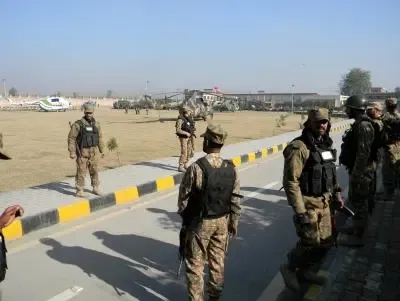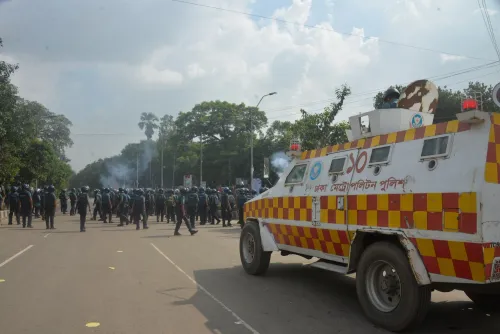Is the Pakistan security apparatus crumbling amid TLP protests and TTP attacks?

Synopsis
Key Takeaways
- Pakistan's security apparatus is under significant strain due to internal protests.
- The TTP has intensified its attacks, causing severe losses for the Pakistan Army.
- International relations with the U.S. and China are at stake as domestic instability rises.
- The situation in Balochistan is critical for both economic and security considerations.
- Public safety and national sovereignty must remain a priority for Pakistan's government.
New Delhi, Oct 9 (NationPress) The security framework in Pakistan seems to be disintegrating as violent protests and terror incidents sweep across Lahore and Khyber Pakhtunkhwa (KP) respectively.
Protests erupted in Lahore following intense clashes between security forces and the Tehreek-e-Labbaik Pakistan (TLP), while in KP, the Tehreek-e-Taliban (TTP) claimed the life of a Major and injured multiple soldiers.
This surge in violence coincides with Pakistan's attempts to form alliances with Lashkar-e-Toiba (LeT) and Islamic State Khorasan Province (ISKP) to combat the TTP in KP and Balochistan.
In Lahore, TLP supporters launched a violent demonstration when security forces attempted to seal their headquarters.
The police resorted to lathi charges, tear gas, and other measures against the demonstrators.
Numerous injuries have been reported on both sides.
The TLP has been protesting against a deal related to Gaza, which they allege is backed by Western powers, especially the United States.
The TLP has urged its followers to march towards the U.S. Embassy in Islamabad following Friday prayers on October 10.
Currently, Pakistan enjoys a favorable stance with the U.S., but is compelled to manage such protests as they stem from U.S. influences.
The situation escalated after the detention of TLP leader Name Chatha in Islamabad.
No signs indicate that tensions will ease, as the TLP has announced a significant sit-in in Islamabad, calling on thousands to converge from Punjab and other provinces.
A high alert has been declared in both Islamabad and Lahore.
Security measures have been tightened in the Red Zone, which contains foreign embassies.
While security forces attempt to quell the unrest in Islamabad and Lahore, the Pakistan Army has suffered immense losses in KP's Dera Ismail.
In a violent confrontation with the TTP, the Pakistan Army lost Major Sibtain from Quetta.
Additional soldiers were also wounded during this encounter.
This marks the tenth instance of a security officer being killed while combating the TTP.
The Pakistan Army is increasingly concerned as the TTP shows no signs of yielding.
In fact, the frequency of their attacks on Pakistani armed forces has intensified.
Earlier this week, during a clash in Orakzai district, the Pakistan security forces lost 11 personnel, including a Lieutenant Colonel and a Major.
Nineteen TTP militants were eliminated in that skirmish.
In March and April 2025, the Pakistan Army recorded the loss of a Captain and a Sepoy during engagements with the TTP.
These incidents underscore the TTP's escalating aggression against the Pakistan Army.
Despite intensified operations aimed at dismantling TTP terror camps, the Pakistan Army has encountered significant casualties, affecting both soldiers and senior officers.
The struggle against the TTP is vital for Pakistan, particularly in light of potential agreements with both the U.S. and China.
The TTP and the Balochistan Nationalist Army (BLA) represent ongoing challenges for the Pakistan Army as they face threats in both KP and Balochistan.
Securing Balochistan is critical for Pakistan due to a minerals agreement with the U.S..
Moreover, China is exerting pressure on Pakistan to ensure the safety of the China-Pakistan Economic Corridor (CPEC), which has faced violent attacks from the TTP and BLA for years.
As China prepares to engage with Pakistan for CPEC 2.0, they have sought guarantees regarding the safety of the project and its workers.
During TTP and BLA assaults, numerous Chinese workers have been targeted, and some have tragically lost their lives.









